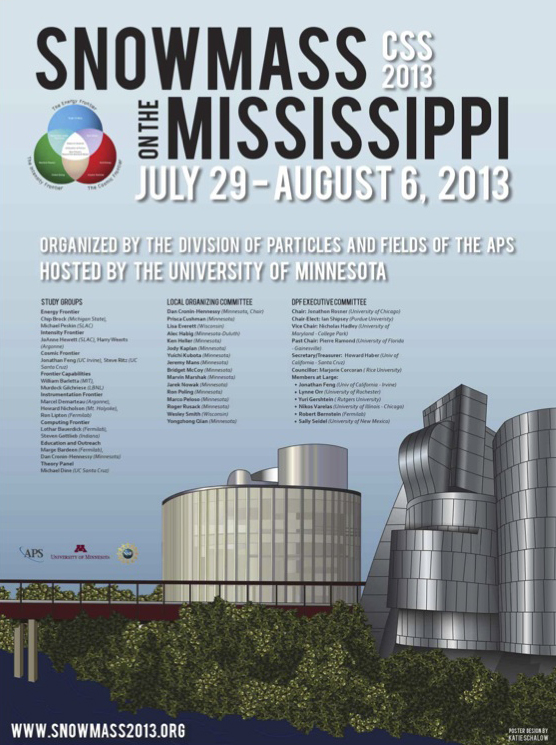Snowmass from Afar
12 August 2013 | By

There's a (potentially) really big deal in physics that's just ended: the Snowmass conference. Ken over at the USLHC blog has already mentioned it, and I've been watching with interest from here in Geneva as well. The meeting, and its reports, are trying to walk an extrodinarily delicate line that's interesting for both the physics and the sociology involved. A really nice summary is here. The Snowmass conferences have a great history in particle physics, including some quite detailed discussions about jet physics that drove the way we talked about jets for much of the last 20 years. It's only really in the last five that we, as a field, have been able to move beyond what was decided at Snowmass in the early 1990s, in fact. So these can be quite important decision-making meetings, where we (again, as a field) get together to decide how we want to standardize things, where our priorities are as a community, what the important outstanding issues are, and so on.
The meeting is fairly US-centric. That comes with the good and the bad. It allows us to judge our programmes fairly against those in other countries, see if our trends are the same, and perhaps adjust the way we do things if we see a better model somewhere else. Of course, if we're trying to make big decisions, it risks making those decisions without the explicit agreement of our friends in Europe - and, of course, without much discussion with colleagues like me who can't attend -- which means they may not be adopted by the full community of physicists. In other words, you get the chance to make important, broad, and sweeping decisions, but you risk no one taking those decisions seriously. It's quite a challenge!
It's also a bit of a challenge following the talks from abroad. In ATLAS we have trained people pretty well to make presentation slides as though people will have to read your talk and won't get to see it. That's critical when a large number of collaborators will be either asleep (in other time zones, not in the room with you, we hope) or in other meetings when you're giving a talk. At Snowmass there's a huge mixture between people who work that way and people who don't; people who treat the slides as notes and people who treat them as a document to be read. Thanks to those who tried to make their notes understandable, though!
This year, money has come up over and over at these meetings, in ways that I've not seen it discussed before. Some of these seem to be really quite adult conversations. Part of the charge of the theory working group seems to be to discuss what a reasonable summer salary and budget is for a professor of theoretical physics, so that they might standardize the grant awards a bit more. I don't know if that's going to work, but it is a very interesting idea - and to my knowledge, things like that have not been openly discussed at meetings like this before. People are raising the interesting issues and not shying away from the painful ones: are we training students well? Are we just training quantitative analysts for Wall Street? Is the distribution of the community among fields correct? Should we try to influence it? How do we deal with no longer being such a big deal in terms of computing needs? The painful part about watching from here is that I can't follow the discussions in much detail, and I want to know what the answers that people are presenting are, not just to see the questions they are asking!
In any case, the various working groups inside of the conference will be producing "white papers" (long reports, basically) over the next few weeks and months. They should contain the first conclusions and answers to some of these questions. Only time will tell if these will be the answers we've hoped for that the community can really get behind, or if they will be another voice trying to bring reason to chaos, with only limited success.
Good luck to the working groups -- we're pulling for you!




